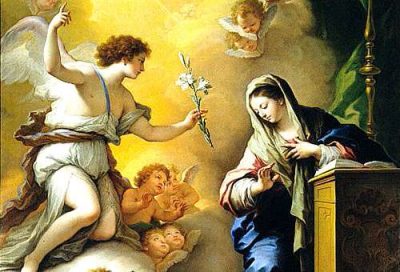Annunciation Invitation – March 25, 2020 – 10:00 AM

The Annunciation of our Lord Jesus Christ
to
the Blessed Virgin Mary
Wednesday, March 25th
Holy Eucharist 10:00 AM
You are invited to make An Act of Spiritual Communion during this time of mandatory isolation from public worship. Please join Fr. Burgess spiritually as he offers the Most Holy Sacrifice of the Altar on our behalf, on behalf of the Church Christ came to redeem, and for the repose of the departed.
The Collect of the Day:
We beseech thee, O Lord, pour thy grace into our hearts, that we who have known the incarnation of thy Son Jesus Christ, announced by an angel to the Virgin Mary, may by his cross and passion be brought unto the glory of his resurrection; who liveth and reigneth with thee, in the unity of the Holy Spirit, one God, now and for ever. Amen.
The Propers of the Day:
-
- Old Testament Lesson – Isaiah 7:10-14
- Psalm 40: 1-11 (BCP pg. 640) or Canticle 3 (BCP pg. 50)
- The New Testament Lesson – Hebrews 10:5-10
- The Gospel – Luke 1:26-38
If you are kept from this Act of Spiritual Communion during the appointed time, please consider reading the Lessons and offering the Collect of the Day prior to your family prayer when gathering for the evening meal.
The following is a short introduction as found in Lesser Feasts and Fasts * 1997.
Today’s feast commemorates how God made known to a young Jewish woman that she was to be the mother of his Son, and how Mary accepted her vocation with perfect conformity of will. It has been said, “God made us without us, and redeemed us without us, but cannot save us without us.” Mary’s assent to Gabriel’s message opened the way for God to accomplish the salvation of the world. It is for this reason that all generations are to call her “blessed.”
The Annunciation has been a major theme in Christian art, in both East and West. Innumerable sermons and poems have been composed about it. The term coined by Cyril of Jerusalem for the Blessed Virgin, Theotokos (“the God-bearer”), was affirmed by the General Council of Ephesus in 451.
Mary’s self-offering in response to God’s call has been compared to that of Abraham, the father of believers. Just as Abraham was called to be the father of the chosen people, and accepted his call, so Mary w as called to be the mother of the faithful, the new Israel. She is God’s human agent in the mystery of the Incarnation. Her response to the angel, “Let it be to me according to your word,” is identical with the faith expressed in the prayer that Jesus taught, “Your will be done on earth as in heaven.” Gerard Manley Hopkins, comparing Mary to the air we breathe, writes:
Wild air, world-mothering air . . .
Of her flesh he took flesh:
He does take fresh and fresh,
Though much the mystery how,
Not flesh but spirit now,
And makes, O marvellous!
New Nazareths in us,
Where she shall yet conceive
Him, morning, noon, and eve,
New Bethlems, and he born
There, evening, noon, and morn —

